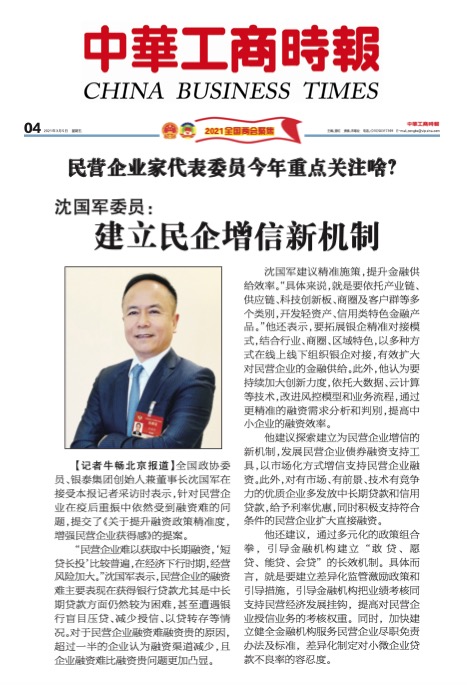China Business Times’s exclusive interview with Shen Guojun: Building a new credit enhancement mechanism for private enterprises
Release Date:March 6,2021
Views:3310
reference:China Business Times

Editor's note: Two sessions in progress. China Business Times recently interviewed Shen Guojun, CPPCC National Committee member, and Founder and Chairman of Yintai Group, and published a report entitled, Committee member Shen Guojun: Building a new credit enhancement mechanism for private enterprises. The following is the full text of the interview.

Shen, CPPCC National Committee member, and Founder and Chairman of Yintai Group, said at the interview that he had submitted a proposal on Improving Financing Policy Precision and Increasing the Sense of Fulfillment of Private Enterprises to specifically address the financing challenges private enterprises still faced in their post-COVID-19 attempt to revitalize.
“Private enterprises have found it difficult to secure long-term financing. Securing short-term financing for long-term investment is more common but this adds to business risk during an economic downturn.” Shen said that the financing challenges private enterprises faced were primarily reflected in securing bank loans, particularly, medium- and long-term loans. Banks had even subjected them to across-the-board loan delays, reduction in credit extension and mandatory deposit for loans. More than half of private enterprises believed that financing had been difficult and costly to secure because of a reduction in the number of financing channels, and that difficultly in securing financing was more problematic than cost.
Shen advised introducing precision policies to increase finance supply efficiency. “Specifically, this means leveraging the industry chain, the supply chain, STAR Market, business districts and customer groups to develop asset-light and credit related special financial products.” He also said that a precise bank-enterprise linkage, comprising industry, business district and regional features, should be developed so that banks and enterprises could be linked online and offline by different methods; this would effectively expand finance supply. In addition, he believed that innovation should be intensified. Risk control models and business process can be improved by leveraging big data, cloud computing and other technology to improve, and with more precise financing demand analysis and identification, SME’s financing efficiency can be increased.
He recommended looking into building a new credit enhancement mechanism and developing bond financing backed instruments for private enterprises so that private enterprise financing may be supported through market-oriented credit enhancement. Elsewhere, banks should extend more medium- and long-term loans and credit loans as well as offer preferential rates to quality enterprises with markets, prospects and competitive technology. They should also actively support the expansion of direct financing by qualified private enterprises.
He also advised introducing a package of diverse policies to guide financial institutions to build a long-term mechanism that would give them the “courage, willingness, ability and will” to lend. Specifically, differentiated regulatory and incentive policies as well as guidance and measures should be established to guide financial institutions toward linking performance appraisal to supporting private enterprise economic development so as to raise the appraisal weighting of the lending business to private enterprises. Meanwhile, the due diligence and exemption measures and criteria that banks adopt to serve private enterprises should be established and improved as soon as possible, and tolerance for the non-performing loans of small and micro enterprises should be differentiated.







